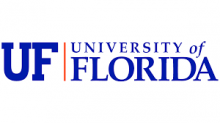Sobre a pesquisadora responsável: "Meu nome é Andreia Fonseca de Faria e sou professora assistente no Departamento de Engenharia Ambiental da Universidade da Florida (UF) em Gainesville. Sou brasileira e me formei em Quimica pela UFV e recebi meu doutoramento na Unicamp. No momento, estou recrutando um aluno de doutorado para o meu laboratorio. Penso que alguns de seus alunos possam se interessar pela chamada e tenham os requisitos necessários (ou parte deles) para uma aplicação. Vou considerar todas as aplicações submetidas até o dia 20 de Fevereiro."
---
Ph.D. position in material sciences and machine learning (4 years)
I am looking for a creative and self-motivated Ph.D. student to join the Department of Environmental Engineering Sciences at the University of Florida in Gainesville, FL, starting FALL of 2024. The project will focus on the application of machine learning techniques to advance the data-driven design of nanomaterials, with a particular focus on graphene, as part of a recently funded NSF CAREER. The students will leverage these techniques to create structured databases on graphene and use them to find useful correlations between synthesis conditions and output properties of the material.
Candidate Requirements
- Hold a bachelor's OR Master's degree in chemistry, physics, chemical engineering, materials science/engineering, environmental engineering, mechanical engineering, or related fields, with programming skills in R and Python. Computer science, computer engineering, electrical engineering, data science, mathematics, statistics, econometrics, economics, operations research, or related fields who have a basic background in chemistry are also highly encouraged to apply.
- A master’s degree is desired but not required.
Desired skills
(consider applying if you have 2 or more of the skills listed) (all applications will be considered)
- Experience working with materials (theoretical/modeling or experimental experience), such as polymers and biopolymers, ceramics, organic or inorganic nanomaterials, or others.
- Proficiency in Python, R, or other modern languages/frameworks suitable for data science and machine learning.
- A solid foundation of statistics (hypothesis testing, outlier detection, statistical inference & analysis).
- Experience with machine learning and statistical methods (automated data annotation, feature selection, model training, correlation analyses, semantic analyses) is a plus.
It would be great to see (a plus)
- Experience with natural language processing (NPL) packages such as NLTK and spaCy.
- Deep learning, large language models, generative AI.
-Experience with machine learning tools such as scikit-learn, TensorFlow, Torch, etc.
- Experience working on GNU/Linux platform (again, not required, but desired).
- Good interpersonal skills and ability to work on research tasks with limited supervision
- Excellent scientific writing and communication skills
We offer
- Competitive stipend and benefits (tuition fully covered).
- Supportive research environment with lab space and equipment.
- Multidisciplinary collaboration with chemists, computer scientists, and material scientists in industry and academia.
- Professional development opportunities, including travel to conferences and workshops, leadership development, and career guidance
How to apply
Candidates are encouraged to contact Dr. Andreia Faria (Email: andreia.faria@essie.ufl.edu) with a subject line as “Ph.D. Application - Your Name.” In addition, please send a single file including:
1. Cover letter that highlights your educational background, research experience and interests, and career goals (1 page only).
2. Curriculum vitae.
3. Unofficial transcripts.
4. Contact information for 3 references (including names, affiliations, and emails).
5. All documents must be in English.
6. Students applying from Brazil can submit files in Portuguese, including the transcripts


